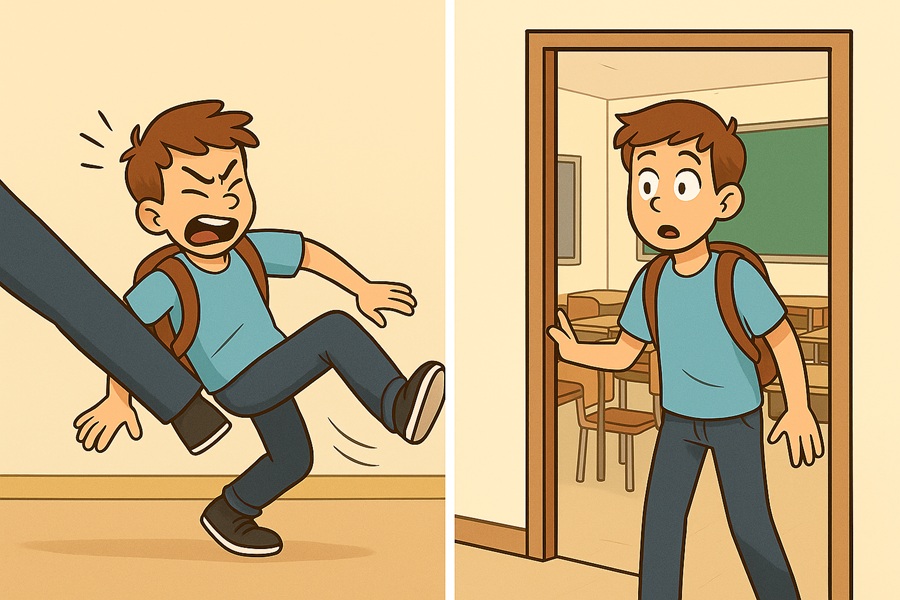- Opinion
- 14 de October de 2025
- No Comment
- 7 minutes read
Kick and chase

THE GREAT SCAM. Opinion Section by David Cerdá

The policy of automatic promotion in Spain —that is, allowing pupils to move up to the next year regardless of their academic results—, introduced under the LOMLOE, has driven grade repetition down to historic lows. But it has done so without offering genuine support to struggling pupils. What we have, instead, is a system that prizes the appearance of success over genuine educational excellence—condemning many vulnerable students to fall behind and eroding the school’s role as a social ladder.
“Making children repeat a year turns them into targets of social exclusion”. This short and specious slogan encapsulates everything that is wrong with the debate on grade repetition. It combines a pinch of emotivism with a heavy dose of mawkishness, and conceals several ideological depth charges that are already going off. Since the idea has been spun from the highest echelons of government, one might even speak of malfeasance.
Under the LOMLOE, repeating a year is deemed an exceptional measure—pupils in primary may do so only once and only at the end of a cycle, while those in compulsory secondary education (ESO) cannot repeat more than twice. It is supposedly to be applied only when all ordinary measures of support have been exhausted. Yet such support measures rarely exist in practice. The result, in most cases, is automatic promotion, reinforced by strong pressure on teachers to comply. As for the impact on a pupil’s self-esteem or self-respect when they move up without reaching the required level—no one measures it, and no one seems to care. The principle of hormesis is entirely ignored: a moderate dose of difficulty, frustration or cognitive stress stimulates learning; too much, of course, is harmful; but the total absence of challenge produces no growth at all. Those who know they will be promoted regardless of effort never mature.
What follows, inevitably, is that the government of the day—it makes no difference who’s in power—celebrates the “achievement”. The rate of grade repetition has dropped year after year, reaching a historic low of 1.1% in primary and 7.0% in compulsory secondary education in 2025. The photo op is in place for the minister to puff out her chest. The shameful truth buried beneath—pupils being promoted with two or three failed subjects, and of course receiving no help to catch up— barely makes the education community bat an eyelid, provided the right people are in charge.
If students are promoted by decree, there will be no repeaters: that is the goal. The objective long ago ceased to be the cultivation of well-prepared, cultured and critical citizens. It is now to produce intellectual paupers, ever dependent on their political shepherds to pull them out of the fire. Let them graduate; we can deal with their precariousness later, when it’s time to ask for their votes.
The incentives are irresistible, and perfectly aligned. For the regional administrator, every pupil promoted is one less cost. For those operating at the national level, it means pretending that Spain is finally converging with Europe’s repetition rates—and so they coast along. For teachers, it spares them the confrontation and bureaucratic ordeal that follow when they fail a student—an ordeal that invariably ends with the verdict in the pupil’s favour; in dubio pro reo, as one hears in staffrooms. For headteachers, it’s another neat graph to justify results. And for parents, relief that their child is not branded a “failure”. There are, of course, honest politicians, teachers, heads and parents who oppose all this. But perverse incentive systems, by their nature, yield perverse results.
This disgraceful policy, in any case, needs willing accomplices. That is the role of a certain “inclusive” left that knows little about social justice, yet give masterclasses in paternalism towards the vulnerable, (selling them out). Anyone raised in a modest or working-class family—without well-off parents—knows that the poor person’s only real chance lies in excellence. Schools exist precisely to serve as social ladders. For that, they must be well funded, demanding, and led by honest and courageous people. What these reckless advocates of the “parents are the meritocracy” line do is consign the vulnerable to social determinism, give them a patronising pat on the back, and rob them of the duty to strive to be their most capable selves, treating them as moral invalids.
George Steiner once wrote that “the best way to dishonour a human being is not to demand of him what he is capable of achieving”. No one disputes that repeating a year is undesirable and should be avoided where possible; but it is the lesser evil if the alternative is to pass the problem on to the next level and complete a collective fraud.
Besides, children—especially adolescents—go through tempestuous years where the law of least effort reigns supreme. Anyone who has ever been that age knows how quickly one learns to exploit a system that lets you coast, and how tempting it is to play along.
If only we would stop cheating ourselves and face this crucial issue in a future education law. Meanwhile, my wish upon a star is that more and more people choose to make their lives harder for the sake of doing what is right: offering real opportunities instead of masking the truth behind cooked numbers.
Source: educational EVIDENCE
Rights: Creative Commons

